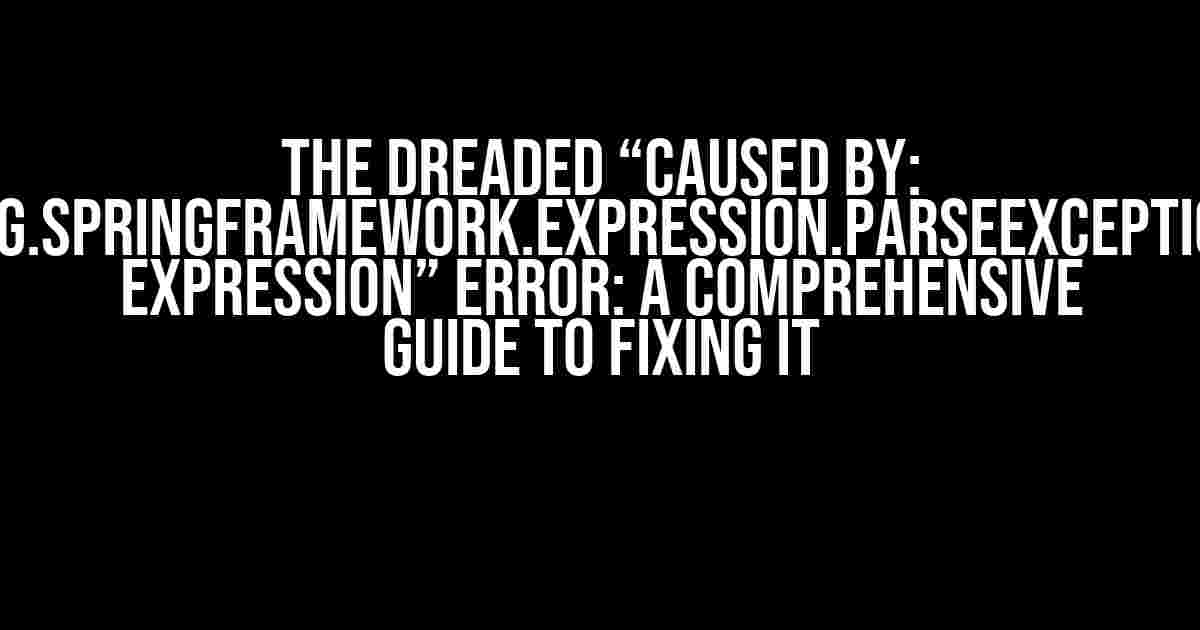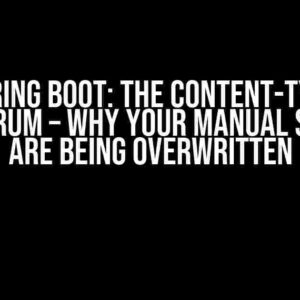Have you ever encountered the infamous “Caused by: org.springframework.expression.ParseException: Expression” error while working with Spring-based applications? If so, you’re not alone. This error can be frustrating, especially if you’re new to Spring or have limited experience with expression parsing. Fear not, dear reader, for this article will provide you with a step-by-step guide to identifying, understanding, and resolving this pesky error once and for all.
What is the “Caused by: org.springframework.expression.ParseException: Expression” Error?
The “Caused by: org.springframework.expression.ParseException: Expression” error is a runtime exception thrown by the Spring Expression Language (SpEL) parser when it encounters an invalid or malformed expression. SpEL is a powerful expression language used in Spring-based applications to simplify data binding, validation, and more. When SpEL encounters an error while parsing an expression, it throws this exception, providing minimal information about the cause.
Common Scenarios Leading to This Error
This error can occur in various scenarios, including:
- Invalid syntax in the expression, such as mismatched parentheses or invalid operators
- Using an undefined or null variable in the expression
- Using an incorrect method or property name in the expression
- Passing an invalid argument type to a method in the expression
- Misconfigured or missing dependencies in the Spring application context
Identifying the Root Cause of the Error
To fix the error, you need to identify the root cause. Follow these steps to diagnose the issue:
-
Check the error message: Carefully read the error message to identify the specific expression causing the error.
-
Review the expression: Inspect the expression mentioned in the error message. Look for any syntax errors, typos, or invalid operations.
-
Verify variable existence: Ensure that all variables used in the expression are defined and initialized properly.
-
Check method and property names: Verify that method and property names in the expression are correct and match the actual implementation.
-
Verify dependency configuration: Ensure that all required dependencies are properly configured and loaded in the Spring application context.
Common Pitfalls to Avoid
When debugging the error, be mindful of the following common pitfalls:
- Overlooking simple syntax errors, such as missing quotes or mismatched brackets
- Assuming that the error is related to the implementation rather than the expression itself
- Not verifying the existence and initialization of variables used in the expression
- Not checking the method and property names for correctness
Resolving the Error: Fixing the Expression
Once you’ve identified the root cause of the error, it’s time to fix the expression. Here are some common solutions:
Syntax Errors
// Original expression with syntax error
#{user.name}
// Fixed expression with correct syntax
#{user.getName()}
In this example, the original expression had a syntax error, missing the parentheses and the getter method. The fixed expression corrects this by adding the parentheses and using the correct method name.
Undefined or Null Variables
// Original expression using an undefined variable
#{undefinedVariable}
// Fixed expression checking for null or undefined variable
#{user != null ? user.getName() : 'Unknown'}
In this example, the original expression used an undefined variable, causing the error. The fixed expression checks if the variable is null or undefined and provides a default value if so.
Incorrect Method or Property Names
// Original expression with incorrect method name
#{user.getNamme()}
// Fixed expression with correct method name
#{user.getName()}
In this example, the original expression had a typo in the method name, causing the error. The fixed expression corrects this by using the correct method name.
Advanced Troubleshooting Techniques
If the error persists after fixing the expression, it’s time to dig deeper. Here are some advanced troubleshooting techniques:
Enabling Debug Logging
Enable debug logging for the SpEL parser to get more detailed information about the error. You can do this by adding the following configuration to your Spring application:
logging.level.org.springframework.expression=DEBUG
Using the SpEL Parser Directly
You can use the SpEL parser directly to test and debug your expressions. Create a test class with the following code:
import org.springframework.expression.Expression;
import org.springframework.expression.ExpressionParser;
import org.springframework.expression.spel.standard.SpelExpressionParser;
public class SpelTester {
public static void main(String[] args) {
ExpressionParser parser = new SpelExpressionParser();
Expression expression = parser.parseExpression("your_expression_here");
System.out.println(expression.getValue());
}
}
Replace “your_expression_here” with the expression causing the error. This will allow you to test and debug the expression in isolation.
Conclusion
The “Caused by: org.springframework.expression.ParseException: Expression” error can be frustrating, but with this comprehensive guide, you should be able to identify and resolve the issue. Remember to carefully review the error message, inspect the expression, and verify variable existence and method names. By following these steps and using advanced troubleshooting techniques, you’ll be well on your way to fixing the error and getting your Spring-based application up and running smoothly.
| Error Scenario | Solution |
|---|---|
| Invalid syntax in the expression | Correct the syntax error, ensuring proper parentheses, quotes, and operators. |
| Undefined or null variable | Check for null or undefined variables and provide default values if needed. |
| Incorrect method or property name | Verify the method and property names, correcting any typos or incorrect usage. |
| Misconfigured or missing dependencies | Verify that all required dependencies are properly configured and loaded in the Spring application context. |
Remember, debugging the “Caused by: org.springframework.expression.ParseException: Expression” error requires patience, attention to detail, and a solid understanding of SpEL and Spring. By following this guide, you’ll be well-equipped to tackle even the most challenging errors and get your application running smoothly.
Frequently Asked Questions
Got stuck with the pesky “Caused by: org.springframework.expression.ParseException: Expression” error? Don’t worry, we’ve got you covered! Here are the top 5 questions and answers to help you troubleshoot and resolve this issue.
What causes the “Caused by: org.springframework.expression.ParseException: Expression” error?
This error is usually caused by a syntax error in a Spring Expression Language (SpEL) expression, which is used to evaluate dynamic values in your Spring-based application. Common culprits include typos, mismatched brackets, or invalid syntax.
How do I identify the specific SpEL expression causing the error?
To pinpoint the problematic expression, check the stack trace or error message for hints. Look for phrases like “at org.springframework.expression.spel.StandardEvaluationContext.getTypedValue” or “at org.springframework.expression.spel.ast.MethodReference.getArgument”. These can help you narrow down the location of the faulty expression.
Can I use a SpEL parser to detect syntax errors?
Yes! You can use the Spring Expression Language Parser (SpELParser) to validate and parse your SpEL expressions. This can help you catch syntax errors before they lead to runtime exceptions. You can also use online SpEL expression evaluators or IDE plugins to test and debug your expressions.
How do I escape special characters in my SpEL expressions?
When working with SpEL, you may need to escape special characters like `(`, `)`, `[`, `]`, `{`, `}`, `!`, or `.`. You can do this by using the backslash (`\`) character to escape these characters. For example, to match a literal `.` character, use `\.` in your expression.
Are there any best practices for writing SpEL expressions?
To avoid errors and make your SpEL expressions more readable, follow these best practices: use meaningful variable names, keep expressions concise, use parentheses to clarify complex logic, and test your expressions thoroughly. Additionally, consider using a consistent naming convention and avoiding overly complex expressions.


